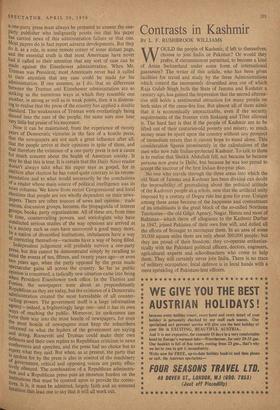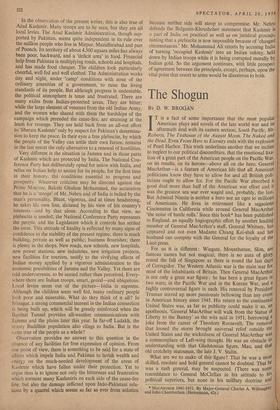Contrasts in Kashmir
BY L. F. RUSHBROOK WILLIAMS WOULD the people of Kashmir, if left to themselves, choose to join India or Pakistan? Or would they prefer, if circumstances permitted, to become a kind of Asian Switzerland under some form of international guarantee? The writer of this article, who has been given facilities for travel and study by the three Administrations which control the enormously diversified area out of which Raja Gulab Singh built the State of Jammu and Kashmir a century ago, has gained the impression that the second alterna- tive still holds a sentimental attraction for many people on both sides of the cease-fire line. But almost all of them admit that it is economically impracticable, even if the security requirements of the frontier with Sinkiang and Tibet allowed it. The hard fact is that if the people of Kashmir are to be lifted out of their centuries-old poverty and misery, so much money must be spent upon the country without any prospect of immediate return that it cannot hope to stand alone. This consideration figures prominently in the calculations of the men who now rule Indian-protected Kashmir. To talk to them is to realise that Sheikh Abdullah fell, not because he became persona non grata in Delhi, but because he was too proud to accept the succour of the first Indian five-year plan.
No one who travels through the three areas into which the old State of Jammu and Kashmir has been divided can doubt the impossibility of generalising about the political attitude of the Kashmiri people as a whole, now that the artificial unity imposed by a century of Dogra rule has gone for ever. Unique among these areas because of the happiness and contentment of its inhabitants is the great block of the so-called Northern Territories—the old Gilgit Agency, Nagar, Hunza and most of Baltistan—which threw off allegiance to the Kashmir Durbar in 1947, joined Pakistan of their own free will, and defied all the efforts of Srinagar to reconquer them. In an area of some 30,000 square miles there are only about 300,000 people; but they are proud of their freedom; they co-operate enthusias- tically with the Pakistani political officers, doctors, engineers, agricultural experts and schoolteachers who come to help them. They will certainly never join India. There is no trace of military occupation; local defence is in local hands with a mere sprinkling of Pakistani-lent officers. lit the observation of the present writer, this is also true of Azad Kashmir. Many troops are to be seen, but they are all local levies. The Azad Kashmir Administration, though sup- ported by Pakistan, seems quite independent in its rule over the million people who live in Mirpur, Muzufferabad and part of PoMich. Its territory of about 4,500 square miles has always been poor, backward, and a `deficit area' in food. Financial help from Pakistan is multiplying roads, schools and hospitals, and has made food cheaper. The children look particularly cheerful, well fed and well clothed. The Administration works day and night, under 'camp' conditions with none of the ordinary amenities of a government, to raise the living standards of its people. But although progress is undeniable, the political atmosphere is tense and frustrated. There are many exiles from Indian-protected areas. They are bitter; while the large element of veterans from the old Indian Army, and the women who shared with them the hardships of the campaign which preceded the cease-fire, are straining at the leash for revenge. They are held back from an all-out effort to 'liberate Kashmir' only by respect for Pakistan's determina- tion to keep the peace. In their eyes a free plebiscite, by which the people of the Valley can settle their own future, remains in the last resort the only alternative to a renewal of hostilities.
Very different is the situation in Jammu and in those parts of Kashmir which are protected by India. The National Con- ference Party has deliberately opted for union with India, and relies on Indian help to secure for its people, for the first time in their history. the conditions essential to progress and prosperity. Whatever criticism may be directed, against the Prime Minister, Bakshi Ghulam Mohammad, the accusation that he is a 'stooge' of Mr. Nehru and of India is belied by the man's personality. Blunt, vigorous, and at times headstrong, he takes his own line, dictated by his view of his country's interests—and by that alone. According to that view, no plebiscite is needed; the National Conference Party represents the people, and the Legislature which it controls has settled the issue. This attitude of finality is reflected by many signs of confidence in the stability of the present regime; there is much building, private as well as public; business flourishes; there is plenty in the shops. New roads, new schools, new hospitals, new power stations, new industries, new irrigation projects, new facilities for tourism, testify to the vivifying effects of Indian money applied by a vigorous administration to the economic possibilities of Jammu and the Valley. Yet there are odd undercurrents, to be sensed rather than perceived. Every- where there are Indian troops, smart, genial—and ubiquitous.
Local levies seem out of the picture—India is supreme.
Although the children seem well fed, many ordinary people look. poor and miserable. What do they think of it all? In Srinagar, a strong commercial interest in the Indian connection is being built up, which will be greatly reinforced when the Banihal Tunnel provides all-weather communications with J Antmu and the plains later this year. In far-off Ladakh, the scanty Buddhist population also clings to India. But is the same true of the people as a whole?
Observation provides no answer to this question in the absence of any facilities for free expression of opinion. From one point of view, there is something to be said for a state of affairs which impels India and Pakistan to lavish wealth and energy on the much-needed development of the areas of Kashmir which have fallen under their protection. Yet to argue thus is to ignore not only the bitterness and frustration which torment many Kashmiris on each side of the cease-fire line, but also the damage inflicted upon Indo-Pakistani rela- tions by a quarrel which seems ,as far as ever from solution because neither side will stoop to compromise. Mr. Nehru defends the Bulganin-Khrushchev statement that Kashmir is a part of India on practical as well as on juridical groun& hinting that a plebiscite is now impossible because of 'changed circumstances.' Mr. Mohammad All retorts by accusing India of turning 'occupied Kashmir' into an Indian colony, held down by Indian troops while it is being corrupted morally by Indian gold. So the argument continues, with little prospect of agreement between the principals, except, perhaps, upon the vital point that resort to arms would be disastrous to both.



















































 Previous page
Previous page